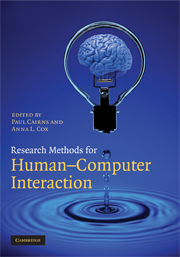Book contents
- Frontmatter
- Contents
- List of figures
- List of tables
- List of contributors
- Preface
- 1 Controlled experiments
- 2 Questionnaires, in-depth interviews and focus groups
- 3 Eyetracking in HCI
- 4 Cognitive modelling in HCI research
- 5 Formal analysis of interactive systems: opportunities and weaknesses
- 6 Using statistics in usability research
- 7 A qualitative approach to HCI research
- 8 Methodological development
- 9 Theoretical analysis and theory creation
- 10 Write now!
- 11 Applying old research methods to new problems
- References
- Index
2 - Questionnaires, in-depth interviews and focus groups
Published online by Cambridge University Press: 05 April 2016
- Frontmatter
- Contents
- List of figures
- List of tables
- List of contributors
- Preface
- 1 Controlled experiments
- 2 Questionnaires, in-depth interviews and focus groups
- 3 Eyetracking in HCI
- 4 Cognitive modelling in HCI research
- 5 Formal analysis of interactive systems: opportunities and weaknesses
- 6 Using statistics in usability research
- 7 A qualitative approach to HCI research
- 8 Methodological development
- 9 Theoretical analysis and theory creation
- 10 Write now!
- 11 Applying old research methods to new problems
- References
- Index
Summary
Overview
With fast changing technologies and related human interaction issues, there is an increased need for timely evaluation of systems with distributed users in varying contexts (Pace, 2004). This has led to the increased use of questionnaires, in-depth interviews and focus groups in commercial usability and academic research contexts. Questionnaires are usually paper based or delivered online and consist of a set of questions which all participants are asked to complete. Once the questionnaire has been created, it can be delivered to a large number of participants with little effort. However, a large number of participants also means a large amount of data needing to be coded and analysed. Interviews, on the other hand, are usually conducted on a one-to-one basis. They require a large amount of the investigator's time during the interviews and also for transcribing and coding the data. Focus groups usually consist of one investigator and a number of participants in any one session. Although the views of any one participant cannot be probed to same degree as in an interview, the discussions that are facilitated within the groups often result in useful data in a shorter space of time than that required by one-to-one interviews.
All too often, however, researchers eager to identify usability problems quickly throw together a questionnaire, interview or focus group that, when analysed, produces very little of interest.
- Type
- Chapter
- Information
- Research Methods for Human-Computer Interaction , pp. 17 - 34Publisher: Cambridge University PressPrint publication year: 2008
- 79
- Cited by



